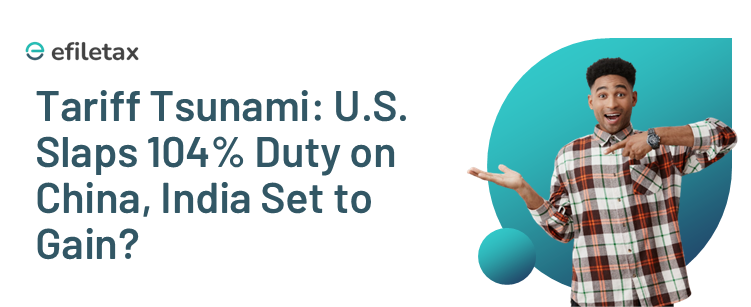
📌 What Happened?
On April 8, 2025, the United States officially imposed a steep 104% tariff on imports from China, according to a White House Executive Order signed by President Donald Trump. This action marks a critical escalation in the ongoing U.S.-China trade tensions.
In retaliation, China is reportedly planning a ban on U.S. film imports, a move that could shake the foundations of global entertainment exports—especially Hollywood. While Trump indicated he is “open to negotiation,” the road ahead appears rocky.
🌍 Global Impact: Why India Should Care
📦 Disrupted Supply Chains
With tariffs this high, U.S. companies will likely diversify away from China, pushing demand toward India, Vietnam, and Mexico for alternatives in electronics, textiles, and machinery.
📈 Exporters in India stand to benefit, especially in:
- Pharmaceuticals
- Auto components
- Semiconductor packaging
- Consumer electronics
Source: World Trade Organization (WTO) 2025 Q1 Trade Outlook
🎬 Hollywood’s Blow: Chinese Ban Looms
If China goes ahead with the ban on American films, the $2.5 billion annual Hollywood revenue from China may vanish. This will hit production houses hard, causing ripples in global licensing, VFX outsourcing, and even OTT content distribution.
India, especially cities like Hyderabad and Mumbai that contribute to VFX and post-production for Hollywood, may face contract slowdowns.
Industry Insight:
“While tariffs hit trade, cultural bans attack soft power economics—this is economic diplomacy under pressure.”
— Prof. Meera Rajan, International Trade Expert, JNU
⚖️ Legal Context: WTO & Case Law Angle
According to Article XX of the GATT (General Agreement on Tariffs and Trade), any tariff increase must be justified under legitimate exceptions like national security or public morals. But history shows such hikes often invite WTO disputes.
💼 Relevant Case Law:
- US–China Trade Dispute (DS543): Previously, the WTO Dispute Settlement Body ruled against U.S. tariffs under Section 301, stating they breached global trade norms.
- Steel Safeguard Case (DS248): U.S. actions were found inconsistent with Article XIX, setting a precedent for tariff invalidation.
📊 How Indian Businesses Can Prepare
✅ Strategic Actions for Exporters & Importers:
- Re-align Supply Chains: Focus on “China+1” export models.
- Negotiate Pricing Flexibility: Include tariff clause contingencies in international contracts.
- Watch Sectoral Trends: Electronics and VFX sectors should monitor Hollywood-China relations.
- Government Support: Leverage schemes like RoDTEP and PLI (Production-Linked Incentive).
🧾 For Professionals & Freelancers:
- Tax Implications: Changes in global trade may impact dollar payments and foreign remittances.
- GST Angle: Be ready for valuation changes in import-export invoices due to forex volatility.